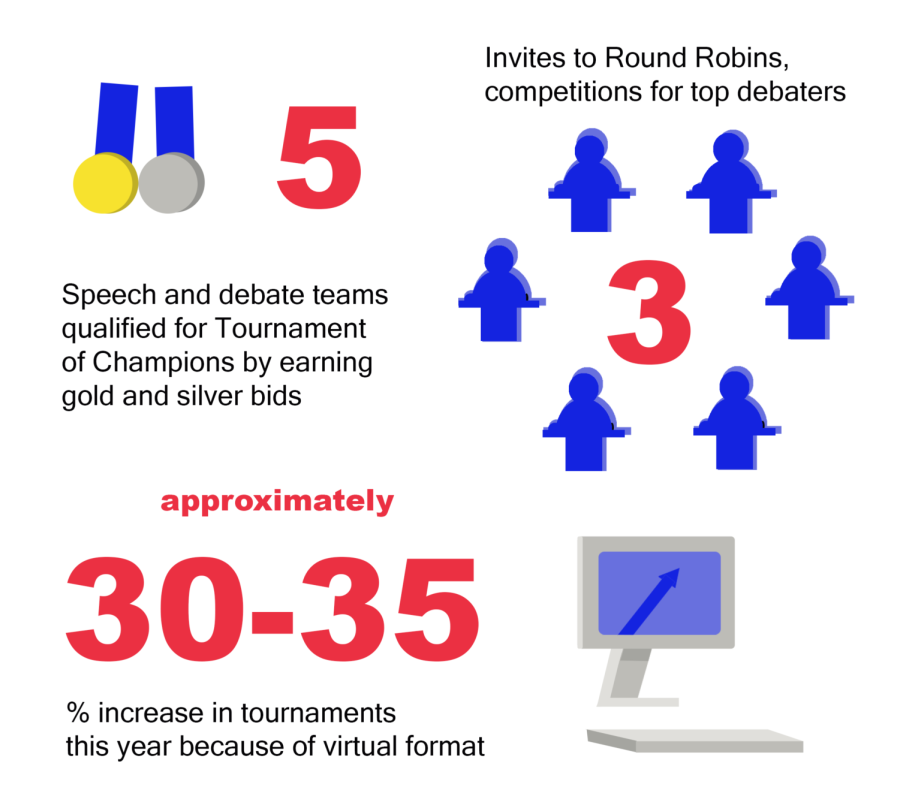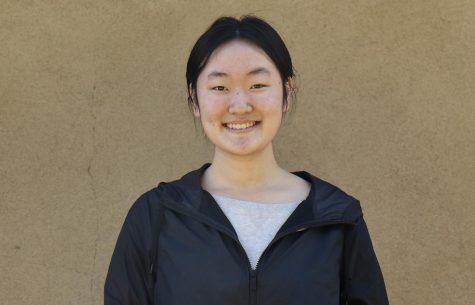Five Lynbrook Speech and Debate teams qualify to prestigious Tournament of Champions in eventful season
Graphic illustration by Melissa Chen
As of March, four Lynbrook debate teams and one individual from Speech have qualified for the prestigious TOC.
March 17, 2021
As of March, four Lynbrook debate teams and one individual from Speech have qualified for the prestigious Tournament of Champions (TOC).
In past years, Lynbrook Debate usually saw only one or two teams qualify. For many high school debaters, a chance to compete at TOC, hosted every May by the University of Kentucky debate team, is highly coveted. Throughout the year, debaters attend competitive tournaments and attempt to earn gold and silver bids, which are given to the highest placing teams. TOC has two divisions: qualification to the gold division requires two gold bids, while the silver requires either two silver bids or one gold bid.
All four debate teams — sophomore Vaibhav Rangan and senior Naman Singhal, who each qualified twice; Rangan and sophomore Kunal Goel; Singhal and junior Derrick Cai; and sophomores Selena Yuan and Ojas Gupta — qualified in the Public Forum (PF) debate event, in which participants debate current events in teams of two. Senior and Head of Debate Keshav Dandu plans to attend TOC as well in the Lincoln Douglas (LD) debate event, in which individuals debate one-on-one. The LD event at TOC requires two bids, so Dandu is applying to attend TOC “at large,” or with only one bid. Lynbrook’s speech team also had one individual, sophomore Akul Murthy, qualify for TOC in Extemporaneous Speaking, in which participants have half an hour to prepare an impromptu speech of a few minutes.
Beside TOC qualifications, many debaters have attained other exceptional achievements this season: Three teams were invited to round robin debates, in which top participants designated by a tournament are invited to debate and showcase their skills prior to the actual competition. Rangan and Goel were invited to the Florida Blue Key Round Robin in October 2020; Cai and Singhal were invited to a round robin hosted by Texas Strake High School in December 2020; and Rangan and Singhal were invited to the California Round Robin, associated with the Cal Berkeley tournament, in February 2021.
One PF team, Rangan and Goel, set a new high for the number of bids won by a Lynbrook sophomore team, a rarity as most “bidders” are seniors who have been debating for years. Rangan and Goel qualified for TOC early on in the debate season in November 2020 and have six bids as of March 2021. Last summer in June, they started preparing intensely for the upcoming season, researching, crafting cases, revising and practicing arguments with other teams.
“We went into this year hoping that we would do well in a lot of tournaments, and I think we achieved that,” Goel said.
At the beginning of quarantine last year, the National Speech and Debate Association (NSDA) announced their NSDA Campus, a platform to host online tournaments. Another platform, Classrooms.Cloud, partnered with Zoom to host tournaments as well. Both require debaters to log in through Tabroom.com, the site which usually manages tournaments and publishes results. With the online platforms in mind, Lynbrook Speech and Debate entered this year’s season confident that tournaments and practices would continue for the most part.
Debate practices remained at their customary times on Wednesday and Thursday afternoons from 5 to 7 p.m. but were hosted on Zoom instead of their usual meeting place, the Lynbrook library. Many debaters felt that the virtual practices allowed for more flexibility and effective collaboration. For example, the breakout rooms function allowed debaters to practice individual rounds together and the team captains and coach to teach beginners and more experienced members separately.
The debate team attended an unprecedented amount of high-level and out-of-state tournaments this year. Last school year, they competed in around five tournaments that distributed TOC bids; this year, the number is closer to 20. The virtual format of competitions allowed Lynbrook debate teams to attend more out of state tournaments, an opportunity that would not have been possible in traditional years when travel was difficult to coordinate.
“The place where debaters learn the most is at the competitions because that’s where everything gets put together in their mind and they have to really apply what they’ve learned,” debate coach Michael Harris said. “The pressure kind of brings that learning to the surface, so the tournaments are definitely the highlight of the year because we basically went to one almost every single weekend.”
This year, the Lynbrook debate team competed in many states including New York, Illinois, Florida, Nevada, Minnesota, North Carolina and Georgia. Competing in tournaments hosted across the country, debaters had to adapt to differences in judging and debating style. Some areas valued style and presentation skills more while others emphasized the content of arguments or speed of delivery.
“Geographically speaking, the East Coast tournaments tend to have a more traditional judging, old school type debate, whereas West Coast judging tends to be more progressive, more technical and more substance based,” Rangan said. “I had to think quickly on my feet and adapt in front of all types of judges.”
Besides judging, debaters also had to adjust to different time zones, which sometimes required them to wake up as early as 5:30 a.m. for rounds. Another drawback to competing online was the absence of time in between rounds for debaters to bond with their teammates and get to know fellow debaters.
“It’s just a lot more fun to be able to meet with people in person, debate in person and roam around college campuses,” Goel said. “It’s just generally a more enjoyable experience.”
With TOC and state and national qualifiers ahead, the debate season is still far from over. Looking further into the future, though, Dandu believes the next school year will be promising for the team, especially at local tournaments. With traveling and in-person competitions likely resuming next year, Lynbrook debaters may face less out-of-state competition at popular local tournaments like the Stanford and Berkeley Invitationals. Also, many Lynbrook debaters have benefited from the practice at tournaments this year and are eager to continue improving.
“I think a lot of team success runs deep, so if one person does well at a tournament, it feels like a good thing because you’ve probably drilled with that person or did prep for them,” Dandu said. “So, even for novices, I think this year has been good because they saw what success looks like and how to get there.”




























































